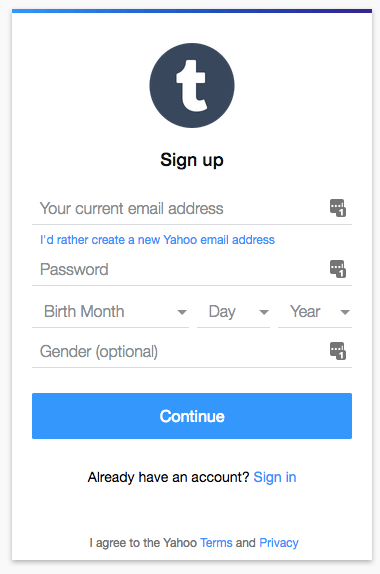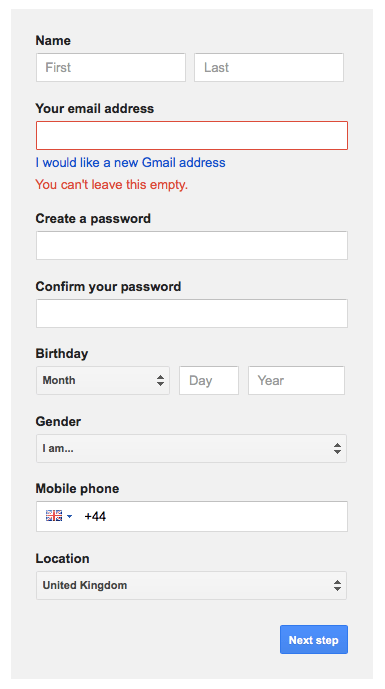Is email dead? I don't think so - but I know lots of people who either don't have an email account or deliberately don't check it. And why should they? Is email a requirement for modern life?
All the major chat apps - WhatsApp, Line, Signal, Wire, Skype - only require a mobile phone number. Hey presto I can communicate with anyone around the world. No email required.
But, suppose I wish to engage in a more public social network - can I do that without an email address? Absolutely!
The two big social platforms on the web - Facebook and Twitter - know that not everyone has an email address.


Once you have one of those accounts, you can use it to sign in to a multitude of different online properties. They are gateways for people without email.
Wikipedia requires neither email nor phone if you want an account there.

Conversely, you must have an email address to use Yahoo (flickr & tumblr) and Google (YouTube).


Why the discrepancy? Obviously it is because Google and Yahoo make money from people having email addresses, not for any technical or sociological reason.
Want to improve your job prospects? LinkedIn isn't perfect, but that's where the traffic is. And you'll need an email address to sign up.
Want to buy stuff? Amazon requires an email. Whereas AliExpress will let you sign up with Facebook.
In the mood for love? Tinder and OK Cupid allow social sign in - whereas Gridnr assumes every gay man has email. I wonder why that is?
I can get onto StackOverflow without an email address - but not GitHub. All the webhosts I could find required an email. PayPal has some great mobile payment options, but won't let you sign up without email.
Every UK bank requires an email address if you want to sign up online.
If you want to watch the BBC's iPlayer - you'll need an email address.
Large swathes of modern life are predicated on the user having access to email. I think that's a problem.
Saving Money
Most utilities in the UK will give you a discount if you want paperless billing. Rather than posting you out a statement each month, they email you a statement or reminder to check your online account.
This is, effectively, a tax on the technically illiterate. If you can't afford a computer or have low IT skills, then you pay more for your gas, water, and electricity.
There's no technical reason why online billing can't be conducted without an email address.
Take a look at your wallet. Is there any reason why your public transport smartcard account needs an email address? Or your store loyalty cards? Or your library card?
Universal Communications
Email is a small subset of Internet communications. Statistics are hard to verify, but there are around 1.5 billion users of email - by contrast there are 2.8 billion users of the Internet.
Half of the online world doesn't use email. Even in the UK, around 7% of online users don't use email. Of those that do use email, around 6% check their email less than every 3 months.
Standards
As I've mentioned before, smartphones are dirt cheap and free WiFi is plentiful in most urban areas. At a lower level, dumb phones are virtually free, and there's no cost for receiving SMS.
But there is a communications imbalance here. Receiving SMS is free - sending SMS costs money. Perhaps only fractions of a penny per message, but it is still more costly than email.
There's also the issue of interoperability. Email is an open standard - anyone can set up a server and send messages to users. Most messaging apps aren't like that. There's no messaging API for WhatsApp. Some platforms have (weak) support for "bots" which can react to a user's question and, in some cases, send messages directly to them.
Would you like to get your water bill via a Facebook message? Perhaps not - but for millions of people it is their preferred comms platform. For many, it is their only platform.
Why should they be forced into using email?
Thoughts
I'm not saying that you shouldn't ask for an email address at sign up. What I am saying is that requiring an email address deliberately excludes lots of people from your service.
Things to consider:
- Do I
need
to communicate with the user?
- If so, is email the only way to do that?
- Will it matter if the user loses access to this specific account?
- What are the different ways to recover access to an account?
- Are there better ways to send a notification?
- Which notifications do users actively want?
- Should users be expected to make urgent decisions based on my communications?
- Not everyone checks mail instantly. Is that a problem?
- Is the literacy level of the audience sufficient to understand long communications?
- Does your message need to be anything more than "Your water bill this month is £12.34"?
- How do you engender trust in your messaging?
- Email is full of spam and scams - can you avoid that with an alternative communications platform?
There is a world beyond email.
You can text - or email - the author using http://edent.tel/
5 thoughts on “I don't have an email address - so what?”
Services requireing a mandatory phone number are ridiculous IMHO. Why do I need a phone number to set up an account on WhatsApp, Signal, Telegram etc.? And Telegram has a one phone number = one account policy. If I want two accounts, I need another phone number.
SMS is sent across networks I don't control or trust (telcos), with no transport security, no verifiability of sender (what's the SMS equivalent of DKIM again?), no end-to-end encryption, and can be spoofed. We've already seen SMS 2FA recovery codes being hacked by socially engineering telcos.
In addition Signal/WhatsApp/Telegram only allow one account per device. Want to have one account/persona for serious work and family stuff, another for bullshitting with friends, and another for giving to random potential stalky people you meet on Grindr/Tinder etc.? In the Signal/WhatsApp/Telegram paradigm, you can't have multiple personas - you are the arbitrary phone number your telco gave you to use on your one device, and you can't be anyone else. You can't have a second account set up on my phone with a fake name, so that some random person so you can chat to a random person you've just met with less risk without revealing the real name and profile image you use with your other contacts. Hell, I remember the AOL CDs from the 90s offering you "five different user personas FREE" etc.
The pitch for the Signal/Telegram/WhatsApp model of secure chat app: "You too can have perfect security from the evil nasty NSA/GCHQ. First off, you sign up with your phone number, and then you give your phone number to everybody who you want to be able to contact you." The developers evidently didn't try that one out on many domestic abuse or stalking victims.
For practical pseudonymity, a throwaway Gmail or Yahoo email account is far easier to acquire and maintain than a second phone number, a second phone handset and so on. The problem with Signal's threat model is that it protects you against the security services at the cost of not protecting from a jealous ex, a controlling abusive partner, an obsessive you met on Tinder who can't take no for an answer, a homophobic fundamentalist family member wanting to out you etc. - the actual people likely to cause you a significant problem when your day-to-day opsec fails.
Terence Eden
I don't disagree with you - I don't think mandatory phone numbers are the answer.
I would also point out that most email isn't encrypted, so any party along the line (including your mail provider) can see your secret tokens.
Richard Cheimison
I refuse to have either email or cellphone. Fuck social media altogether. I use the internet to download books. I hate most people and make a point of being as hard to contact as possible. Anyone who doesn't know where I live and won't come to my house isn't someone I want to talk to.
Can't you use your Email as an IM? And like SMS, there is no server storage. So no storage expense. Hint: search for chatmail.
IMO, requiring an Email is better than requiring a phone number. In some countries, like mine, phone numbers are tied to real identity of people. We don't have anything named burner phone. You want a number, you provide an ID which has photograph as well as your national ID(it's a number here).
But you can also require neither. And actually some websites(not big ones) don't require an email. They just tell you if you forget your password, they won't be able to recover it for you. Still, some admins recover the accounts using other metadata about the user. For instance, I remember a shell server was asking about status of me private files(readable only by me). Then he recovered me account.
PS: I saw WebMentions and I'm being tempted to add it to me website. Long live indie web! :>
I wanted to comment, but then saw that it says "Your Email (required)". The irony of this is pretty huge!
I've gone email-less for the last 4 years or so. Not had too many problems, went through redundancy and finding a new job two years ago, that was easy enough, probably the worst one was trying to sign my son up to an after-school science club he wanted to go to, and they insisted that I needed email to register him. I spoke to them on the phone, and finished the conversation with "I'll see if I can borrow a friend's email then to register him." The response surprised me... "You can't do that! Email addresses personally identify you, you can't use someone elses!"
"Alright," I said, "I actually do have an email address, let me give it to you now - IAmDavidBeckham@gmail.com". After a short pause she said, "Really??". I said, "No, but I think you see my point now." There is absolutely NO requirement or law that your email address actually identifies you, or even that you use your actual name to register.
The only major problem I've had is with the Child Maintenance Service. They send you your account number, your automatically generated security number, and create your login to their online portal using these. An email address really isn't required. I've had access to this portal for years. As soon as I informed them my email address was closed, they stopped me from being able to access this portal. Permanently. I've never used my old email address with the CMS, they just had it on record, that was it. Letters came in the post, they never sent anything by email. Why they felt I had to lose access to the portal, I don't know. But apart from that, having no email has been easy to deal with. I'll not be going back.
What links here from around this blog?